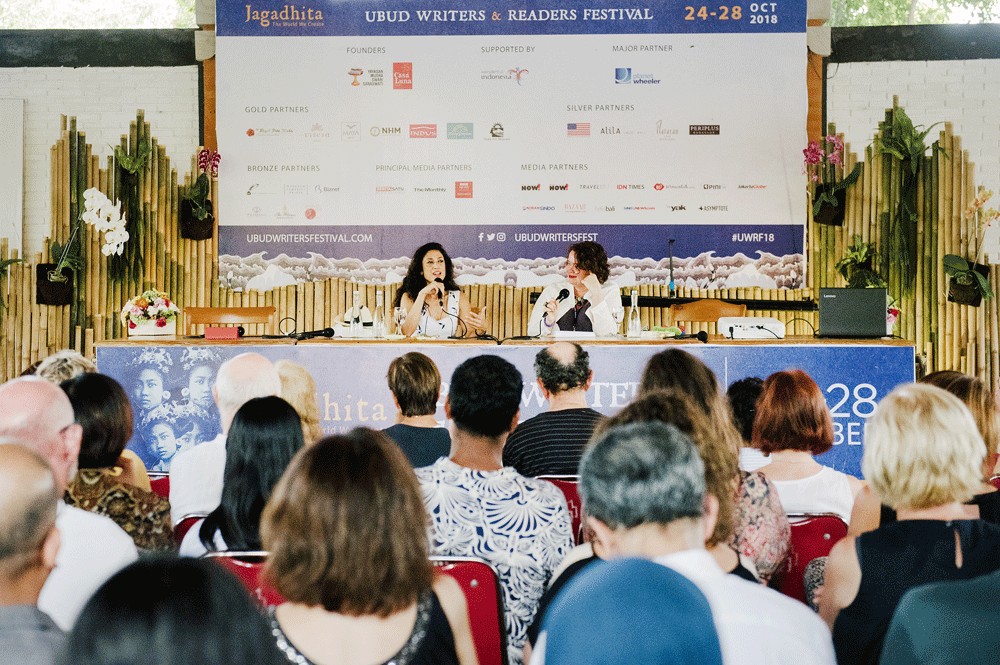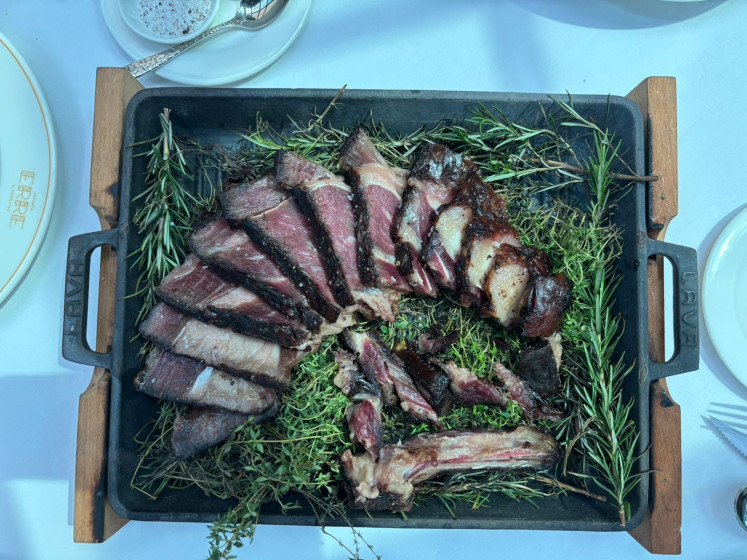Popular Reads
Top Results
Can't find what you're looking for?
View all search resultsPopular Reads
Top Results
Can't find what you're looking for?
View all search resultsFatima Bhutto questions what it means to belong
Pakistani author Fatima Bhutto explores in her new novel how we can create safe harbors for ourselves in a world of increasing alienation and segregation.
Change text size
Gift Premium Articles
to Anyone
 Author’s talk: Author Fatima Bhutto (left) discusses her latest novel The Runaways, which explores the issue of human identity in a global context, in an event moderated by Australian Broadcasting Corporation’s Radio National (ABC-RN) journalist Kate Evans (right) during the 2018 Ubud Writers and Readers Festival in Bali. (Photo courtesy of UWRF/Wirasathya Darmaja)
Author’s talk: Author Fatima Bhutto (left) discusses her latest novel The Runaways, which explores the issue of human identity in a global context, in an event moderated by Australian Broadcasting Corporation’s Radio National (ABC-RN) journalist Kate Evans (right) during the 2018 Ubud Writers and Readers Festival in Bali. (Photo courtesy of UWRF/Wirasathya Darmaja)
A
fghan-born Fatima Bhutto knows what she is talking about when she writes about the horrors of political violence in a sociopolitically divided world in her latest novel, The Runaways (2018, Penguin).
Born in 1982 to Pakistan’s famous Bhutto political dynasty, she has lost four family members to political violence. Her grandfather Zulfikar Ali Bhutto was executed in 1979, her uncle Shahnawaz Bhutto was murdered in 1985, her beloved father Mir Murtaza Bhutto was assassinated in 1996 and finally her aunt Benazir Bhutto was assassinated in 2007.
She was also her aunt’s fiercest critic, blaming Benazir’s ambition as the primary cause of her father Murtaza’s assassination.
She became a journalist and writer instead of pursuing a career in politics. She studied at Columbia University in the United States and the School of Oriental and African Studies at the University of London.
She reflected on the multiple tragedies that had befallen her family in her 2011 memoir Songs of Blood and Sword.
Read also: 'To Obama': Opening a backdoor into the presidency
Haunted by the violence she had witnessed and by writing such memoirs, “writers sort of cut their wounds wide open, exposing them to air in order to allow themselves to heal”.
Distressed by the global violence and turmoil that continue to happen all around her, she continues the healing process by writing and talking about her latest novel, which asks the big question of what it means to truly belong in a world where we are constantly pressurized to fit in and not given permission to become who we truly are.
Her publisher’s website describes the novel in an all-caps one-liner as “an explosive new novel that asks difficult questions about modern Muslim identity in a world on fire”.
“To be asked questions such as ‘What are you?’ and ‘Who are you?’ can be very disconcerting for us,” Bhutto told an audience during the recent 2018 Ubud Writers and Readers Festival in Bali.
The novel’s story revolves around three characters from three very different backgrounds.
First, we will meet Anita Rose, who lives in Karachi’s biggest slum and has her life transformed after meeting a man who owns a big library, teaching her how to escape through literacy.
On the other side of Karachi lives Monty, a rich and privileged child who is sheltered from the outside world’s harsh realities, thus always afraid of the world around him. Until one day, he meets a rebellious girl who shows him a grim picture of the world they both live in.
Then there is Sunny, whose father left India and went to England to give his son the opportunities he never had. Yet Sunny never feels like he belongs there. Only when his charismatic cousin returns to his life, he begins to explore that life holds more possibilities than he ever imagines.
Their lives intersect with sociopolitical turbulence that will require them to make choices that lead to dire consequences. The book also incorporates the contemporary topic of how extremists use social media accounts such as YouTube to propagate their ideology.
“I started writing this novel, when the Islamic State [IS] came to the scene, terrorizing the world in a spectacular and terrifying way. IS has increased the production values of their propaganda videos significantly. Now they have music, subtitles and are visually great, making them look like The Bourne Identity trailer,” she said, referring to a 2002 Hollywood production.
Horrified by the IS’ violent and grotesque manner of executing its victims, Bhutto said she embarked on a journey to discover answers to her curiosity on how people could resort to such violent extremism.
In her journey, she began to grasp the class, ethnic and religious fragmentation occurring in the world right now, particularly with the immigration crisis in Europe. She distilled some of the results of her learning process in her latest novel.
“So far, people’s reception of the novel has been very good. The characters’ experiences are also understood by people outside Pakistan, so it’s not an issue reserved to Pakistan only. People who have migrated to other countries also say they enjoy reading it,” she said.
“In India and Pakistan, turbulence only turns women into stronger individuals, mold them into fearless people who keep fighting to just keep going with their lives.”
She continued that being a constant wanderer — she had spent her childhood dividing time among Pakistan, Afghanistan and Syria — she enjoyed writing in airports while waiting for her flights.
Despite the crowded atmosphere of airports, she said she enjoyed the fact that everybody was too busy with their own business to care about hers; this gave her a sense of privacy and focus.
Having written another novel called The Shadow of the Crescent Moon in 2014, a number of poetry anthologies as well as columns for The Daily Beast, New Statesman and other publications, she said she would “never finish” her job as a writer.
“I always learn so many new things when I am working. I feel that writers are lucky, you know, because we are always challenged. Everything I thought was true for one moment could turn out not to be true later; I find the learning process to be a very stimulating experience,” she said.










